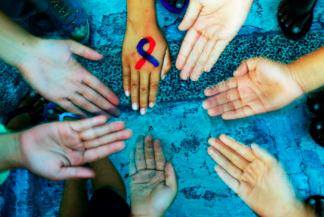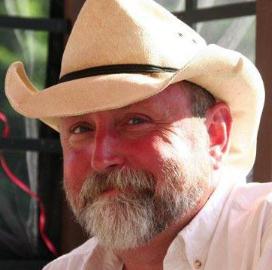
"PWA was a place of deep, abiding, ingrained compassion. Something I call 'The Amazing.'"
I was pretty much a child when AIDS first entered my life. It was the mid-’80s and I was coordinator of lesbian and gay youth at The 519. My first boyfriend had died while I was at university, and suddenly I was working with kids like me who were coming out, then getting sick and dying. I was 18. By the time I was 21, I had already buried more friends than my parents; my roommate was living with AIDS and struggling with debilitating diarrhea, alarming wasting and the onset of dementia. I was attempting to cope by participating in a support group at the AIDS Committee of Toronto for care-partners when I met Gloria MacIsaac, who was the volunteer coordinator at PWA, and Doug Guest, who told me they were looking for a full-time fundraiser. I got the job.
In those days, I was utterly and completely shameless; I could ask anyone for anything, believing as I did that “no” means only “ask me later.” In mid-1990, I was interviewed for the director of development position at the Toronto People with AIDS Foundation (PWA) and started working for the agency 15 minutes after my interview began. Back then, this work looked vastly different than it does today. Yes, I wrote grants, spoke with donors and managed special events, but it was so much more than that. Back then, there really weren’t any written job descriptions; there certainly weren’t clearly defined roles and responsibilities, nor were there rigid boundaries between board, staff, volunteer or client. I’m not even sure we had bylaws back then, but I’m guessing we must have done because we had a charitable number and we weren’t giving it up! None of us had degrees or certificates that had prepared us for this work. We just didn’t know any better and were really good at parking our emotional mess in the short term and getting it done. We became experts on making do, stepping up, winging it and flying by the seat of our pants.
Although I was the fundraiser, it was expected that if we needed a speaker and no one was free you would speak. That if a client came in and everyone else was busy you’d step in and offer what support you could. “Other duties as assigned” meant heading up buddy teams and being on at least two palliative care teams. It meant covering the drop-in and running craft class or training a volunteer on reception or maybe “de-fagging” a client’s home because he was dying, his parents were coming and he wasn’t out. It meant getting up at six to decorate a float for Pride. It meant driving to New York with a car-load of PWAs for aerosolized pentamidine treatments. It meant coordinating the rally against the pharmaceutical company’s double-blind study or getting people to the die-in at Queen’s Park on time. It meant advocating for clients in hospital — with their care teams — to ensure the clients got fed or had their sheets changed. And it meant collecting medicines from the bedsides of newly dead men to give away to others who couldn’t afford them.
Money was tight. Extremely tight. As many programs as possible had cost recovery built in — the drop-in had a craft class that sold what they made to buy more supplies. Honoraria from speaking engagement went back into covering costs to get to other talks or refreshments for training. The benefits-and-assistance counsellors had a very limited supply of cash on hand for emergencies, and there were days when I would go out to get a donation from a donor, come back, give it to Jim Gaylord, who was manager of the benefits-and-assistance department, who would give it in turn to the next client who walked through the door.
We were all running at 500 miles per hour and reeling from loss after loss after loss. These were the days of five funerals a week, and the people who were dying were not simply clients: they were your friends, former tricks, lovers, acquaintances and colleagues. Within a month of my starting at PWA, Paul Maingot had died; within six months, so did three board members and innumerable volunteers and clients, and by the end of the year we had lost two more staff — Richard Bender and Bob Hutchinson. Jim March died seven months after that. How did we get by? I don’t know, really. We were very good at parking it in the immediate — you know, taking your feelings and bracketing them in your heart and head, promising yourself that you’d get around to dealing with it all later — and moving on to the next crisis.
Oh, we cried and we railed and we protested, but we also partied like frat boys and we fucked like rabbits. My liver still hasn’t recovered from a couple of the parties we threw or from the three-day wakes after a particularly keen loss. Every fundraiser was an excuse to let off a little steam; every single staff and board member and volunteer would turn out and it’d “go off” until the wee hours. As long as you were back in the office by 10 the next day, you were golden. I’ll never forget the bowl-a-thon that ended as a street brawl outside Woody’s. Or the Dykes Do Drag event at Chaps/Power— Gloria MacIsaac, Deb Parent and Ruthann Tucker in serious drag. I have never laughed so hard in all my life! Priceless.
As for sex, well, having sex in the middle of all this was a way of reminding yourself you were alive. In hindsight, it was also probably fuelled by survivor guilt and the deep desire to feel anything good. The fact that we were having sex with each other, with other workers and volunteers in the movement, well . . . who else could understand what we were going through? Don’t judge us by today’s standards. We were all living through it together; you could be a board or staff member one day and a client the next.
We tried to do some grief work, but when we met with a grief consultant supplied by Rosar-Morrison — which was where we spent a lot of our time — she was so completely out of her depth that we reduced her to tears of frustration. We knew more about grief and surviving loss than she would learn in her lifetime, if she was lucky. The way we behaved wasn’t always healthy, and it certainly took its toll on many of us, but we coped because we had to. There wasn’t time to fold. So you burnt the candle at both ends until you literally had nothing left to give and then you’d take a break — maybe go on vacation — and come back and hope none of your colleagues had died while you were away.
If I’ve given the impression we were all a bunch of booze-ridden sex addicts with no real skills, I need to tell you now that PWA was a place of deep, abiding, ingrained compassion. Something I call “The Amazing.” It was a safe place, and the people I was fortunate to work alongside — paid and unpaid, HIV-positive and -negative, homo and hemophiliac — were driven by the overwhelming need to protect, cradle and nourish the bruised and battered psyches and spirits of the women and men who came to our doors looking for assistance. We were all people living with AIDS loving other people living with AIDS and asking, “How can I make this bearable? How can I improve your life or your death?”
We didn’t just ask, “What practical supports do you need to maintain your edge to fight the disease in your body?” We asked, “With your permission, how can I be your voice when you can’t speak up?” We said, “Allow me to be your shoulders when you have burdens to carry. Let us be your solace when your heart is breaking and the steadfast shore that the waves of rage you’re feeling can crash against. Without judgment. Without expectation. Without more emotional debt.”
I was privy to remarkable acts of self-sacrifice from a team of people who were incredibly overworked, overwhelmed and in many cases literally dying on their feet as they helped others. This commitment to service, this compassion, this “Amazing” is what sustained us as staff and family during this time. But more than that, it seeped into the fabric of the Toronto PWA Foundation. It is who we are.
Of all the men I worked with at that time, only two of us are still alive. It hurts. And I have struggled over time with why I was one of the few to make it here. But I am so grateful that I knew these brilliant, flawed, human and superhuman men. I cherish the relationships that still exist from that time.
Adrian Betts is the executive director of the AIDS Committee of Durham Region. This is an excerpt from a speech he delivered at PWA’s 25th anniversary.

 Why you can trust Xtra
Why you can trust Xtra


